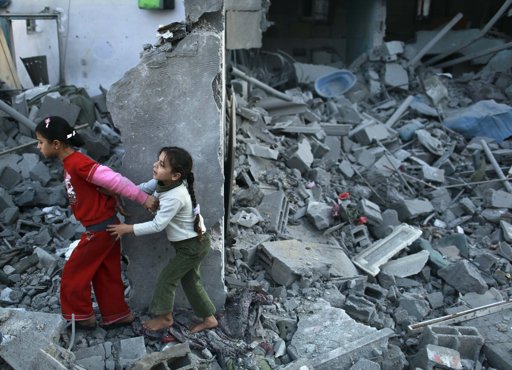 |
Israeli police detain Palestinian protesters in East
Jerusalem. A 14 year old American boy was killed
there by a police bullet.
24 OCT 14
|
At least, that's one story we're given.
Objectivity paints a larger picture. As in all national conflicts, the short explanation is inadequate.
Today, Palestinian children get less water and food than Israeli children. It's national policy, enforced by the military.
Today, a Palestinian family, supposedly citizens of Israel, can be evicted without cause from their house where they've legally lived for generations. For no other reason than that of their Arab roots.
But the community tolerated Palestinians in their midst, didn't they?! Then came Hamas, the Islamic Resistance movement ... Well, yes; things have escalated, perhaps because for forty years, Palestinians been without redress when they were arrested or killed for peaceful protest. They've had no peaceful recourse to being driven from their homes and denied the means to feed themselves.
Palestinian activists, human rights defenders, journalists and academics are frequently picked up off the streets, out of their homes in the middle of the night, in front of their families – Israel's thug soldiers take them off to jail and inter them without trial, often in conditions of torture and isolation. Military courts then rubber-stamp the actions of Israel's military and spy agencies.
(25 OCT 14) There was one salient example of their regime only this week. Abdullah Abu Rahme, one of the main organisers of popular resistance against Israel's apartheid wall in the village of Bil'in, was convicted by one of the Israeli military's kangaroo courts of "obstructing the work of a soldier". In a 2012 incident, Abu Rahme tried to stop a military bulldozer from clearing land on which to build the wall.
The administrative issues, like permits and driver's license and business documents are different and more difficult if you're Palestinian.
The segregated society is supported by policy, by practice, and law. A young Jewish boy in the city would not likely ever have occasion to sit down in a comfortable setting with Palestinian kids his own age. Much like white South Africa under Apartheid, Israel is a segregated nation.
OK, that's another story we're told.
The Zionist agenda;
In September 2008, in supposed response to Hamas rocket attacks, Israel began carpet bombing in Gaza ... on a school day ... at precisely 11:25 AM, the turnover time for morning and afternoon school when the most children would be concentrated in the streets. The attacks on civilian population areas continued for 21 days, the bloodiest period in the nations history since 1967. Much was made in the news of destroyed Hamas sites, but no mention was made of the cost.
OK, that's another view we're given.

Four hundred Palestinian towns were 'depopulated' in the 1947-9 war. Most houses were destroyed, mosques and churches put to other uses, and cemeteries plowed under. The communities were driven out. Refugee Palestinians have since carried their village names, memories, and possessions with them into the diaspora.
Their villages and towns continue to be captured, cleared, and renamed. Their monuments from the last fifteen-hundred years are destroyed. Their rights are cancelled.
While the borders of Israel are internationally recognized, it remains an occupied territory as defined under international law. The Israeli treatment of the nation's occupants is discriminatory oppression under international law. The annexation of East Jerusalem was ruled "null and void" by the UN Security Council; Israeli sovereignty over the annexed territory has not been recognized by any country.
Israel claims to be democratic and to support universal suffrage, yet there are more than 50 Israeli laws that discriminate against Palestinian citizens of Israel in all areas of life, including their rights to political participation, access to land, education, state budget resources, and criminal procedures.
The administrative issues, like permits and driver's license and business documents are different and more difficult if you're Palestinian.
The segregated society is supported by policy, by practice, and law. A young Jewish boy in the city would not likely ever have occasion to sit down in a comfortable setting with Palestinian kids his own age. Much like white South Africa under Apartheid, Israel is a segregated nation.
OK, that's another story we're told.
The Zionist agenda;
- conquer the land from the Jordan River to the Mediterranean
- remove the Arab people, their culture and history
 |
| Palestinian girls run away after an Israeli air strike in the northern Gaza Strip. November 18, 2012. |
OK, that's another view we're given.

Four hundred Palestinian towns were 'depopulated' in the 1947-9 war. Most houses were destroyed, mosques and churches put to other uses, and cemeteries plowed under. The communities were driven out. Refugee Palestinians have since carried their village names, memories, and possessions with them into the diaspora.
Their villages and towns continue to be captured, cleared, and renamed. Their monuments from the last fifteen-hundred years are destroyed. Their rights are cancelled.
While the borders of Israel are internationally recognized, it remains an occupied territory as defined under international law. The Israeli treatment of the nation's occupants is discriminatory oppression under international law. The annexation of East Jerusalem was ruled "null and void" by the UN Security Council; Israeli sovereignty over the annexed territory has not been recognized by any country.
Israel claims to be democratic and to support universal suffrage, yet there are more than 50 Israeli laws that discriminate against Palestinian citizens of Israel in all areas of life, including their rights to political participation, access to land, education, state budget resources, and criminal procedures.
Israel has broad anti-discrimination laws that prohibit discrimination by both government and non-government entities on the basis of race, religion, and political beliefs, and prohibit incitement to racism,[1] yet extreme racism against Arabs in Israel exists in institutional policies, personal attitudes, the media, education, immigration rights, housing, social life, and legal policies.
Us and them, or us against them?
All these stories are widely accepted among various hearer groups. Each considers their view to be the definitive truth. So how might the issues be resolved? Can they be resolved?
Lots of possibilities going forward. Switzerland has managed well as a confederation of states, as has Belgium. It's a known viable option. Not a difficult choice, perhaps, unless you require everyone to be like you. That's apartheid; it's been tried before.
What we know for sure is that if you've chosen to agree with just one side against the others, there are a lot of people who think you're wrong, and for quite good reasons.
Us and them, or us against them?
Zionists see themselves as refugees from around the world, fleeing the pogroms and persecutions, returning to their homeland from which they were driven fifteen centuries before. They were denied citizenship in the countries where they lived, they were driven out of their homes leaving everything behind. They were hunted down and killed along with their children.
Critics of Palestinian resistance see them as irrationally violent, ethnic/religious murders whose goal is to wipe Israel from the earth.
Palestinians see themselves as refugees in their own land, victims, driven from their homes, denied citizenship and the means to provide for their own, attacked and killed along with their children.
Critics of Palestinian resistance see them as irrationally violent, ethnic/religious murders whose goal is to wipe Israel from the earth.
Palestinians see themselves as refugees in their own land, victims, driven from their homes, denied citizenship and the means to provide for their own, attacked and killed along with their children.
Critics of Zionism see it as a colonialist or racist ideology that has led to the denial of rights, dispossession and expulsion of the "indigenous population of Palestine".
So that's yet another few perspectives we're offered.
It is worth noting, the Arab nations that surround Israel were created not by Arabs but by decree. England and France spent five years in secret negotiations following the WWI. The resulting borders were arbitrarily written without regard to the occupants.
The prevailing rationale behind these artificially created states was how they served the imperial and commercial needs of their colonial masters. Iraq and Jordan were created as emirates to reward the noble Hashemite family from Saudi Arabia for its loyalty to the British against the Ottoman Turks during World War I, under the leadership of Lawrence of Arabia. Iraq was given to Faisal bin Hussein, son of the sharif of Mecca, in 1918. To reward his younger brother Abdullah with an emirate, Britain cut away 77 percent of its mandate over Palestine earmarked for the Jews and gave it to Abdullah in 1922, creating the new country of Trans-Jordan or Jordan, as it was later named.
And on, and on. So ...
It is worth noting, the Arab nations that surround Israel were created not by Arabs but by decree. England and France spent five years in secret negotiations following the WWI. The resulting borders were arbitrarily written without regard to the occupants.
The prevailing rationale behind these artificially created states was how they served the imperial and commercial needs of their colonial masters. Iraq and Jordan were created as emirates to reward the noble Hashemite family from Saudi Arabia for its loyalty to the British against the Ottoman Turks during World War I, under the leadership of Lawrence of Arabia. Iraq was given to Faisal bin Hussein, son of the sharif of Mecca, in 1918. To reward his younger brother Abdullah with an emirate, Britain cut away 77 percent of its mandate over Palestine earmarked for the Jews and gave it to Abdullah in 1922, creating the new country of Trans-Jordan or Jordan, as it was later named.
And on, and on. So ...
All these stories are widely accepted among various hearer groups. Each considers their view to be the definitive truth. So how might the issues be resolved? Can they be resolved?
Lots of possibilities going forward. Switzerland has managed well as a confederation of states, as has Belgium. It's a known viable option. Not a difficult choice, perhaps, unless you require everyone to be like you. That's apartheid; it's been tried before.
What we know for sure is that if you've chosen to agree with just one side against the others, there are a lot of people who think you're wrong, and for quite good reasons.







































.jpg)
